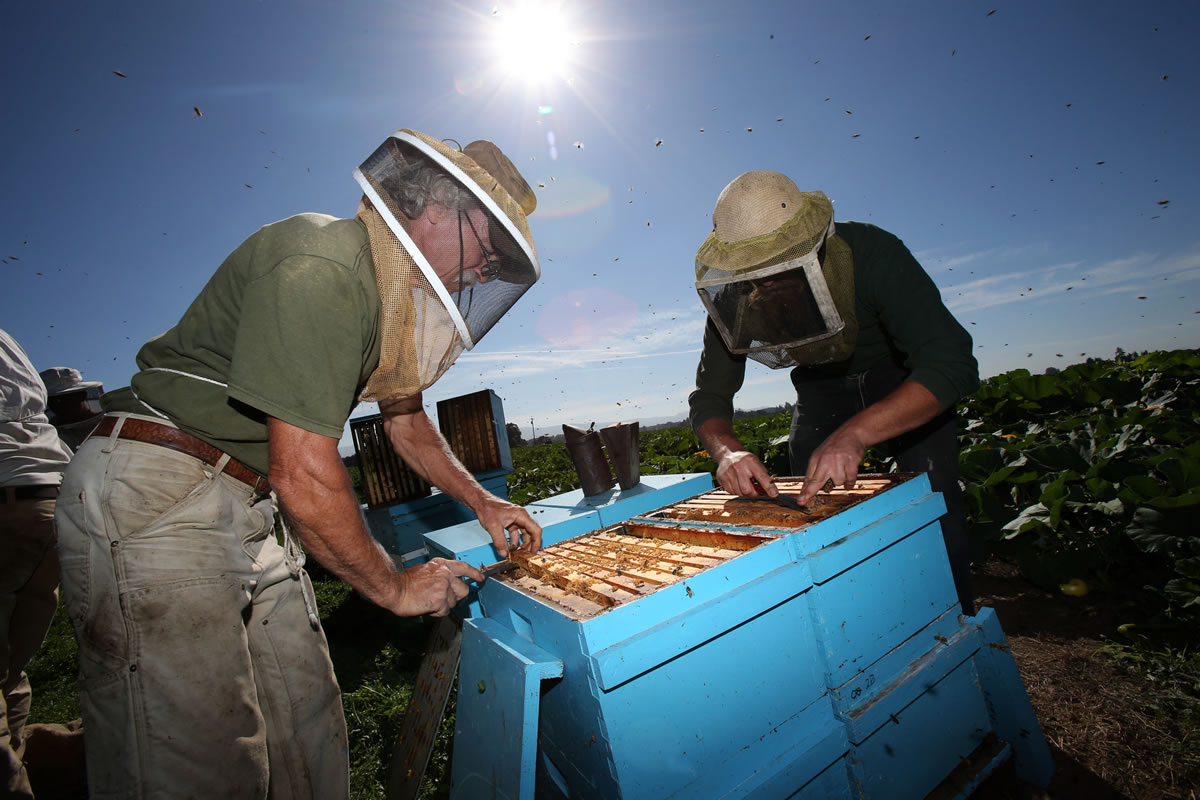EUGENE, Ore. — Alan Turanski became fascinated with beekeeping the first year he tried it. That first milestone: harvesting 160 pounds of blackberry honey from his hives.
Since then, his involvement in beekeeping and the honey industry has only deepened. He’s now vice president at GloryBee Foods, the Eugene-based food, honey and beekeeping supply company his parents started more than 30 years ago.
The company has its roots in Turanski’s garage, but now it has a west Eugene headquarters and clients across 13 countries.
Yet even with the company’s success, Turanski, like many others whose line of work is tied to bees, is deeply worried about environmental threats that seem to be hammering bees and bee hives with increasing frequency.
The problem — known as colony collapse disorder — poses a threat not only to the honey industry but also to agricultural sectors that rely on bees for plant pollination in order to produce many fruit, vegetable and nut crops.
“We’re on the path to see the end of the honeybees, and that’s a grave concern,” Turanski said.
“Bees are just so critical, and I think really trying to create a lot of awareness and ultimately support — moral and financial — to change the path that the bees are on is necessary.”
One big problem: No one is quite sure what’s causing bee colonies to experience die-offs.
In 2006, beekeepers nationwide began reporting high losses of 30 percent to 90 percent of their hives.
Since then, bees have been in the spotlight consistently as the news media coined phrases such as “beepocalypse redux,” “beemageddon” and “plight of the bumble bee.”
Bee parasites and farming or domestic insecticides are suspected culprits.
“It’s really the cumulative effect of all these things that at this point can be called” colony collapse disorder, Turanski said. “Pesticides, herbicides, fungicides, mites and the stress on the bees from traveling for pollination.”
Turanski said that one reason colony collapses are so hard to understand is that there is not just one cause.
Ethan Bennett is a beekeeper at Honey Tree Apiaries, a 450-hive bee pollination and honey production business in Alpine in southern Benton County. He transports his bees in their hives to pollinate a range of crops around the state, and he sells his honey at the Corvallis Farmers’ Market.
“What I would say my experience is with bees is that it’s just gotten harder and harder to keep them alive,” he said.
“Colony collapse disorder is a really broad term. It has no specific cause. It doesn’t fit the definition of a disease or anything like that.”
Bee colony collapse has been highly publicized in recent months, and it is “definitely for real,” he said.
After all his years in the bee industry, the diligence of the bees continues to impress Bennett.
“They’re really neat creatures and they live in this community which in turn acts as a single organism,” he said.
Lisa Arkin is executive director at Beyond Toxics, a Eugene-based nonprofit organization that tries to cut down on pesticide use and chemical pollution.
Beyond Toxics started receiving calls about two years ago from local beekeepers. They said they were having trouble with hives because of a certain type of insecticide called a neonicitinoid, Arkin said.
The class of chemicals, which contain nicotine, become absorbed into a plant and is transferred through its vascular system, potentially making the plant, its pollen and its nectar toxic to insects.
In March, a coalition of beekeepers and farming advocates sued the federal Environmental Protection Agency, accusing the agency of inadequate testing of neonicotinoids. That case is pending.
In April, the European Union passed a two-year ban on neonicotinoid insecticides, citing the potential threat to bees. High doses of the chemical can be lethal to bees, while sublethal doses can either be taken back to the hive.
There, the insecticide will become stored in the wax, leading to future problems, critics say.
The pesticide industry has disputed claims made by critics of the chemical.
In June, approximately 50,000 bees died after a pesticide with neonicitinoids was sprayed on blooming Linden trees at a Wilsonville Target store that bees happened to be pollinating.
“Unfortunately, the bees died. But in some way I felt they sacrificed themselves to alert the public of the immense danger we face if our bee colonies are unable to survive,” Arkin said.
Arkin and Beyond Toxics have been trying to get the Oregon Department of Agriculture to impose a statewide ban on all neonicitinoids.Oregon Rep. Earl Blumenauer has introduced legislation in the U.S. House of Representatives to ban neonicotinoids until the EPA can conduct a review.



